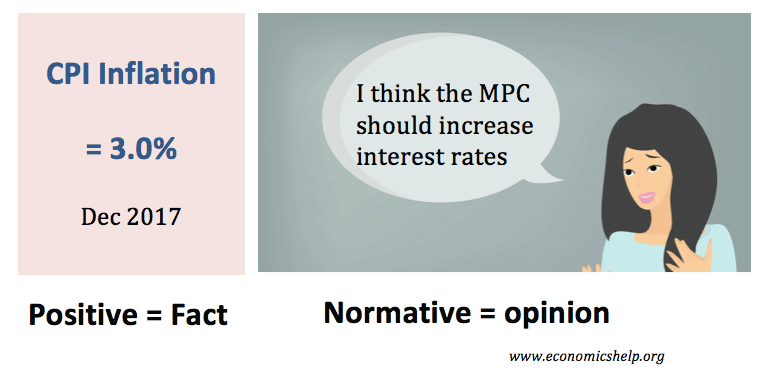A positive economic statement is a statement that can be verified true or false.
A normative economic statement is an opinion. It is a view that others may disagree with.
Postive economics
- In the UK, Dec 2017 CPI inflation is 3.0%
- In the UK the rate of unemployment has increased by 50% in the past three years.
Normative Economics
This is the expression of an opinion.
- The MPC should not be concerned about the rise in CPI inflation because it is due to temporary factors.
- Unemployment is more important than inflation in the current economic situation
- The MPC should increase interest rates to deal with the rise in inflation.
- The government should try to reduce inequality
- Privatisation leads to a more efficient allocation of resources
Both the above statements are value judgements, you can’t prove it right or wrong by merely looking at statistics. Some economists believe the first statement, others believe the second statement is more valid.
Economics is part science part art. The science is the positive economics – finding data such as inflation and unemployment statistics. However, with this data, you can make very different judgements.
The rise in inflation is a good example of how economists can reach very different conclusions from the same data.
Other examples
- UK public sector debt is 60% of GDP. – positive
- An increase in GDP per capita leads to an increase in living standards – normative. Higher GDP doesn’t necessarily lead to higher living standards.
- Mixed economies are the best form of economic system. – normative (even though the vast majority of economists would agree.)


FALSE.
This is bad philosophy from 70 years ago.
Entrepreneurial learning is the central causal force in economics.
That is a “positive”, not a normative statement.
And there is no “verifying” it in the failed philosophy of science sense of Carnap and the rest.
Economists are living in a by-gone world of failed philosophy of science from the dark ages.
Dark age Positivism is DEAD.
Time to update.
“A positive economic statement is a statement that can be verified true of false.”
Thomas Kuhn, Karl Popper and others long ago showed that explanatory success dominates in science, explanations provide the “positive” content, and Carnap’s failed vision of “verification” — STILL accepted as dogma by economists living as if it were the 1930s — has nothing to do with it.